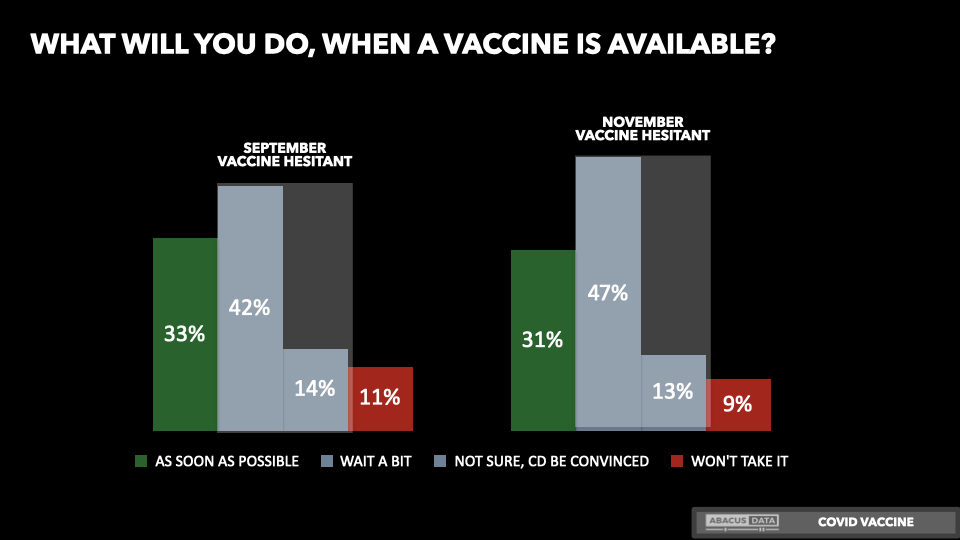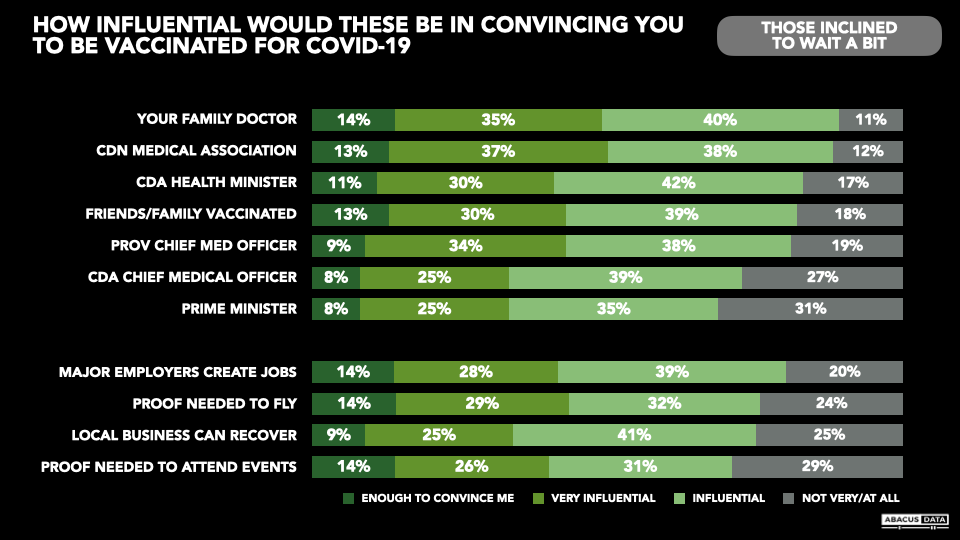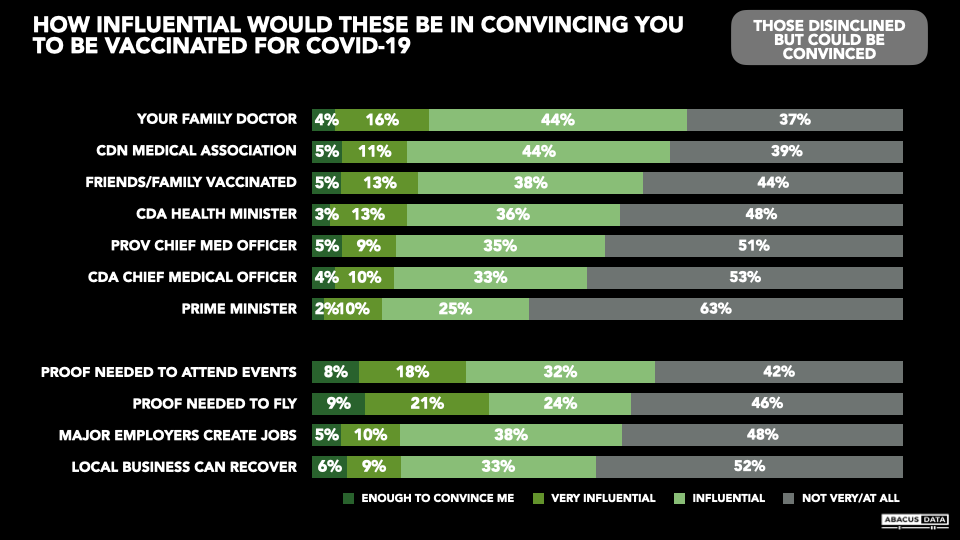Doctors key to overcoming COVID-19 vaccine hesitancy
December 7, 2020
In our latest national survey, we explored how best to overcome the hesitancy which might keep some Canadians from taking the Covid-19 vaccine as soon as it is available to them.
Roughly a third of those surveyed in September (33%) and November (31%) say they would get vaccinated as soon as possible. A larger number say they would get a vaccination but might wait a bit to see how things turn out (42% in September/47% in November) Just over one in 10 people (14% September, 13% in November) say they are not inclined to want to take a vaccination but could be persuaded to. And about 1 in 10 say they will not be vaccinated under any circumstances.

In other words, between 56% and 60% of Canadians show some degree of vaccine hesitancy. This hesitancy could help alleviate some friction as the supply of doses accelerates to meet the demand for those doses.
However, if as the months unfold, hesitancy continues and there are more doses than people willing to take the vaccination – the pandemic could be elongated with continuing health and economic impacts.
We asked those who are hesitant (60%) of our sample, which might influence them to be vaccinated.
Here’s what we found:
• Most of the hesitant say that several things would be influential, indicating that communications can help effect a broader takeup of the vaccine. Among those who say they are disinclined but could be persuaded, at least a half say that different elements we tested could influence them.
• At the top of the list of what would help influence people to take the vaccine are messages and encouragement from their family doctor, as well as from the Canadian Medical Association, which is the voice of doctors in Canada. This underscores the vital nature of tapping into the confidence people have in medical professionals especially on matters of safety and efficacy – and particularly given the evidence that the conversation can be derailed by partisan politics.
• Messages and encouragement from Canada’s Health Minister would be influential for 83% of those inclined to wait a bit, and about half of those who are disinclined but could be convinced. To extrapolate, if both these conversion rates (from hesitancy to vaccination) held, 77% of Canadians would be vaccinated.
• Peer influence is also highly important. As more people learn that their friends, family, co-workers have decided to take the vaccine and experience no harmful side effects, momentum towards acceptance will grow.
• We also looked at the effectiveness of messages that emphasized how widespread vaccination could speed a vaccine return to a normal lifestyle and economic times. The results showed that these messages are effective with roughly 3 out of 4 of those inclined to wait a bit and about half of those “disinclined, but could be persuaded”. The idea of requiring proof of immunity to attend sporting or other events, or to fly on a commercial flight has a lot of potential impacts, as would reminders from businesses small and large that employment levels and in some cases the survival of the businesses depend on getting back to normal sooner.


UPSHOT
According to Bruce Anderson: “Success with a COVID-19 vaccine rests not only on getting the vaccine produced and delivered to Canadians but it also requires a high level of public confidence and acceptance of the safety of the vaccine and the urgency of community immunity. This poll underscores that the ideal effort to reduce vaccine hesitancy includes advice from doctors, confidence-building by public health leaders, and reminders that the lifestyles people miss and the economic confidence that is shaken are both dependent on resolving this pandemic as quickly as possible, and that taking a vaccination is a critical step in that process. Safe vaccines, widely taken. get us to normal faster.”
ABOUT ABACUS DATA
We are the only research and strategy firm that helps organizations respond to the disruptive risks and opportunities in a world where demographics and technology are changing more quickly than ever.
Find out more about what we are doing to help clients respond to the COVID-19 pandemic.
We are an innovative, fast-growing public opinion and marketing research consultancy. We use the latest technology, sound science, and deep experience to generate top-flight research-based advice to our clients. We offer global research capacity with a strong focus on customer service, attention to detail and exceptional value.
We were one of the most accurate pollsters conducting research during the 2019 Canadian Election.

Contact us with any questions.
Find out more about how we can help your organization by downloading our corporate profile and service offering.
METHODOLOGY
The survey was conducted with 1,419 Canadian adults from November 26 to December 1, 2020. A random sample of panellists was invited to complete the survey from a set of partner panels based on the Lucid exchange platform. These partners are typically double opt-in survey panels, blended to manage out potential skews in the data from a single source.
The margin of error for a comparable probability-based random sample of the same size is +/- 2.1%, 19 times out of 20.
The data were weighted according to census data to ensure that the sample matched Canada’s population according to age, gender, educational attainment, and region. Totals may not add up to 100 due to rounding.




